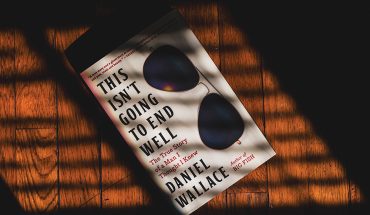Middle-grade book writer Ali Standish talks about her new book, quarantine reads and her dedication to independent bookstores.
by Susanna Klingenberg
Ali Standish writes the books that keep your kids up reading past their bedtimes. The local middle-grade author is known for stories with mystery and heart, and her fifth book, How to Disappear Completely, is no exception. With the book’s release later this month, Standish had been looking forward to connecting with readers in bookstores and classrooms across the country. The events were all canceled, of course, but the author isn’t letting that stop her. We talk to Standish about quarantine reads, independent bookstores, and what her new story can teach us about resilience.
Your fans are all anticipating How to Disappear Completely, and it has already received some incredible reviews. But let’s hear your take on it: what do you hope readers will enjoy about the book?
I always try to write the kind of book that I was endlessly searching for as a middle-grade reader—something with mystery and suspense, characters I could laugh and cry with, and a glimmering thread of magic. This story has all three! To be honest, this is something reviewers tend to either really admire or really disapprove of—the fact that I pack so much into my books—but I think there is room in a great story for many twists and turns, threads and themes. (And I think a lot of kids agree with me!)
How to Disappear Completely starts with Emma, the twelve-year-old protagonist, grieving her beloved grandmother. While she’s at Gram’s funeral, she notices a very pale spot on her foot, and soon she is diagnosed with vitiligo. Vitiligo is an autoimmune condition that strips pigment away from spots or patches of your skin. It’s very common (my own husband’s diagnosis was what motivated me to write this story), but also quite poorly understood by the general public.
Emma’s story is, at its heart, about her coming to terms with the new world she’s living in—one where she can’t lean on her Gram and has to face her changing appearance on her own. But it’s also about the magic—both literal and figurative—of childhood and Emma’s quest to keep it from slipping away. When Emma starts to write a fairytale in a secret journal she and Gram hid in the woods long ago, someone begins writing back to her. And it’s through solving the mystery of the anonymous pen pal that Emma is ultimately able to make sense of her new life. Did I need to include fairies and gnomes and shadowy figures lurking in graveyards in a book about loss and self-acceptance? Probably not, but I think the story is the better for those unexpected additions! I hope this novel will have a little something for everyone.
Unexpected loss and resilience sounds like a good read for this moment in history.
I hope so. Emma’s world is rapidly turned upside down just like many of us have found our own lives irrevocably changed by the COVID-19 pandemic. Things we once took for granted are lost to us (at least for now), and many of us are grieving, either for loved ones or for life as it used to be. Emma has to grapple with how to let go of the things she’s forced to, while still holding on to who she is. And that is the task facing many of us now, too. I hope her story can address some of what readers are going through while still offering an immersive escape from the pandemic and from the four walls of their houses!
You had lots of events lined up for the release of this book and were hoping to host a launch party at Quail Ridge Books, as you’ve done for your other releases. Since necessary safety precautions are keeping people at home, how can readers connect with you about How to Disappear Completely?
I may have had to cancel local events, but the beauty of technology means that I can replace those events with virtual ones. And doing things virtually allows me to connect to readers all over the country. I am teaming up with two other amazing middle-grade authors, Mae Respicio and Supriya Kelkar, for a celebration of our spring releases. We’ll be coming to readers live at 5 p.m. EST on Saturday, May 16th. (Look out for more details on my website, Facebook and Twitter pages.) And I’m very excited to be offering free virtual classroom visits through the end of the school year. Hopefully, I can connect with a lot of kids that way! Interested educators can email me at alistandishbooks@gmail.com to schedule a visit.
You’ve been an advocate for local bookstores in the past. Why should people get your book at their local indie?
Look, I know Amazon is a tempting prospect. They offer things cheap and they offer them fast. Why go out of your way to buy a book separately when you can get it along with your vegetable peeler and your pool noodles and your biodegradable dog poop bags? It’s a strong pitch. But here is my pitch for independent bookstores…
Indies do so much for their communities. They bring authors to their stores and into local schools. (I’ve met some of my favorite authors at Quail Ridge!) They host book clubs and other events where folks can come together to share thoughts and ideas, and to learn from one another. They offer a safe place for everyone and a strong sense of community in a very divided time.
Independent booksellers also connect readers to new authors. They don’t just use an algorithm to analyze your buying history. They will listen closely to what you love in a book and recommend something for you (or your dyslexic niece, or your impossible-to-buy-for father-in-law). They take the time to get to know their readers individually, which a behemoth retailer simply can’t do. Most readers find out about my books through a passionate bookseller (or librarian or teacher). Without independent bookshops selling books like mine, publishing shrinks down to a small set of voices, and we lose so many diverse and precious stories.
Right now, the staff at Quail Ridge, Read With Me, McIntyre’s, The Regulator, Flyleaf, and so many other area bookstores are working hard to make sure that readers get the books they want (and need) as quickly as possible. They are stepping up during this bleak time. That effort is not without risk, and it’s emblematic of how much value indies bring to our communities.
What would Emma, the main character of How to Disappear Completely, tell readers facing this unprecedented time of COVID-19 and social distancing?
She would tell them to use their imaginations. As Gram says: “Imagination is one of the greatest gifts we have. If we build it up strong enough, it can be anything we need it to be. A home. A friend. An entire world.” As long as you have your imagination, you aren’t quarantined. Close your eyes and daydream, or break out a pencil and a fresh sheet of paper and you can go anywhere and do anything you want.
She would also say that it’s okay to be afraid of what’s happening and what’s to come. It’s natural to feel sad and anxious. But we can’t give up or give in to those feelings. We can’t let ourselves disappear completely. We have to fight to hold on to the important things—our passions, our relationships, our health. It’s in the fight that we find out who we truly are. It’s through the fight that we come out the other side stronger than we were before.




